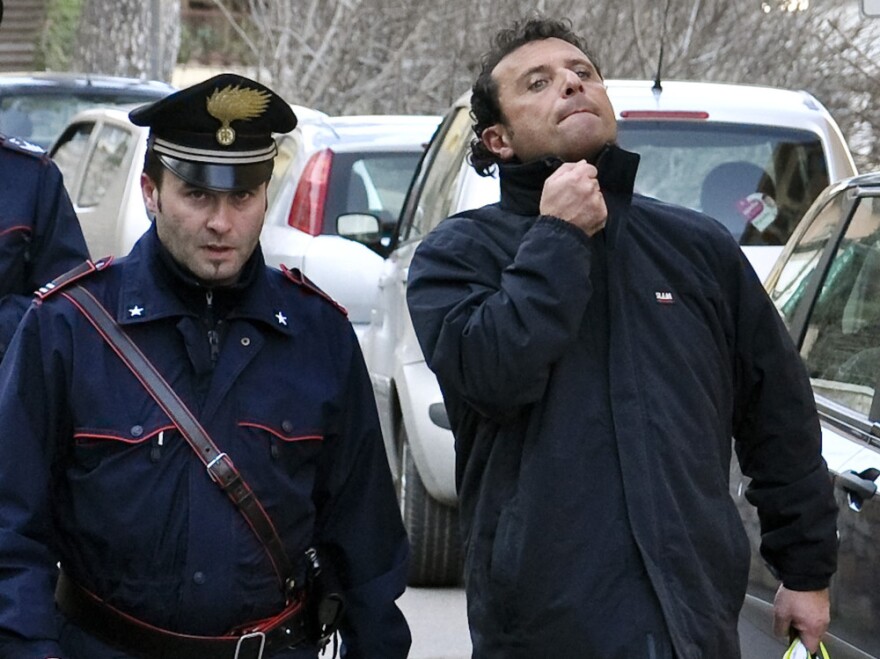Five days after a cruise liner slammed into rocks off Italy's Tuscan coast, the country is gripped by the contrasting profiles of two key figures in the drama — the captain charged with abandoning ship and the captain who demanded he get back onboard.
For many Italians, the accident has become a metaphor for a country that sees itself mired in economic and moral decline.
Francesco Schettino, the disgraced captain of the 1,000-foot-long floating palace known as the Costa Concordia, is under house arrest on suspicion of multiple manslaughter, shipwreck and abandoning ship.

Italians are now mesmerized by the audio of a heated conversation between him and coast guard Capt. Gregorio De Falco.
During the four-minute conversation hours after the collision, an increasingly enraged De Falco orders Schettino to return to the ship and help coordinate the evacuation of the many remaining passengers.
"You've abandoned ship! I'm in charge now," De Falco rages at Schettino, who was apparently in a rowboat at this time. "Go back and report to me how many passengers [are still onboard] and what they need. ... Perhaps you saved yourself from the sea, but I'll make you pay for this, dammit!"
Schettino can be heard trying to refuse the order. "You don't understand, it's dark here. Can't see anything," he says.
"What is it, you want to go home Schettino?" De Falco spits out. "It's dark and you want to go home?"
Eventually De Falco demands: "Go back onboard, damn it!"
De Falco's Italian expletive is actually much harsher than "damn it" — but the line has become a national catchphrase and is Italy's top trending hashtag, or keyword on Twitter.
Minutes after that audio was posted online, Italians had a new hero.
Within hours, a Facebook page created in De Falco's name had 10,000 friends.
By Wednesday morning, his words were a national slogan, with T-shirts being sold online with the words, "Go back onboard, damn it."
An Unlikely Hero
De Falco is an unlikely idol — 48 years old and balding, with a gray beard. He tried to avoid reporters as he entered a magistrate's office to give testimony for the investigation, insisting he's no hero.
But judging from comments posted on Twitter, Facebook and newspaper websites, many Italians disagree.
One tweet from a woman named Sofia Rosada said, "It's men like De Falco who should be governing, instead we are full of men like Schettino."
A boy named Salvatore Garzillo wrote, "The next time someone asks me what I want to be when I grow up, I'm going to say, a man like De Falco."
Yet several Twitter comments were similar to this one: "How low have we fallen that we make a hero of a person who simply did his duty?"
"Go back onboard, damn it!" has exploded into a howl of indignation against the incompetence, greed and corruption that have pervaded Italian society in recent decades.
By steering his ship with 4,200 people onboard too close to a rocky coastline, Schettino's nautical bravura was all too reminiscent of what many commentators call "Berlusconismo."
They are referring to the extravagant lifestyle associated with former Prime Minister Silvio Berlusconi, who was synonymous with flashiness and cutting corners.
The new prime minister, Mario Monti, has to deal with a potentially bigger shipwreck — the eurozone debt crisis.
He has, at least for now, yielded the spotlight to Corrado Clini, his environment minister. Clini is closely monitoring the risk of an ecological disaster should fuel leak from the stricken cruise ship into the Tuscan marine sanctuary.
So far, no fuel has seeped out. But rescue operations were suspended Wednesday because of the ship's movements. Eleven people have been confirmed dead, and 24 are missing.
Copyright 2021 NPR. To see more, visit https://www.npr.org.




